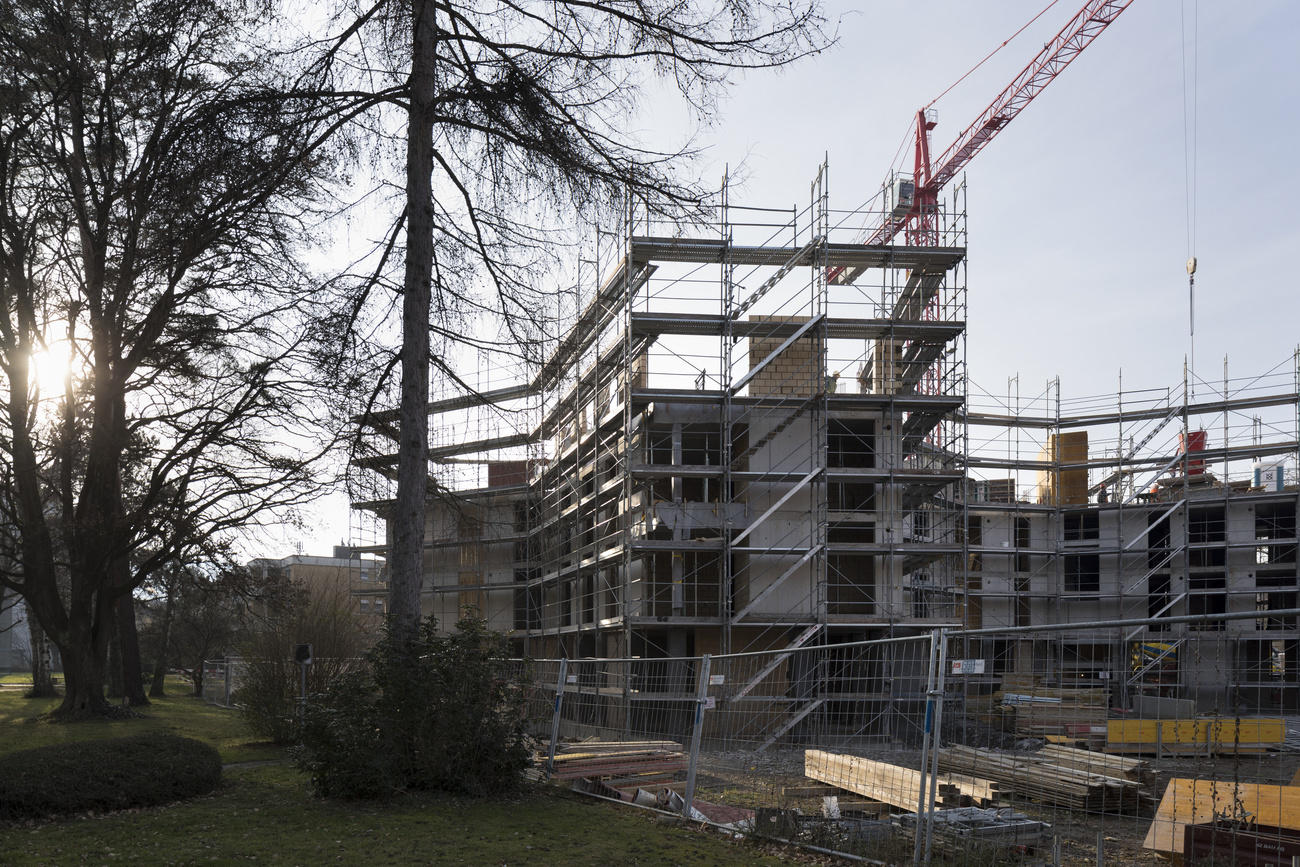Support for social housing collapses, anti-homophobia reform remains solid

A proposal to combat real estate speculation has lost public support and is unlikely to win a majority in a nationwide vote in Switzerland on February 9, according to pollsters. Opponents of a proposal for tighter anti-homophobia rules are also set to fail.
A people’s initiative that calls for a 10% quota of social housing is backed by just over 50% of respondents taking part in a nationwide poll commissioned by the Swiss Broadcasting Corporation (SBC).
An opinion poll published on Wednesday shows the margin between supporters and opponents has shrunk to 6%, down from 30% in a first survey published in December.
For details see graphic below:
“Criticism of the initiative – expected high administrative costs and the risk of an investment freeze for renovation projects – have won the upper hand,” says Lukas Golder, co-director of the leading GfS Bern research instituteExternal link, which carried out the poll.
Left-wing parties and women in urban areas still support the proposal, the survey found.
“But ultimately, this initiative is most likely to suffer the same fate as most other left-wing initiatives,” says Golder. He expects a rejection by around 60% of voters at the ballot box in ten days’ time.
So far, campaigning has remained relatively low key, as a survey of the country’s media coverage shows. “It would take an extraordinary shock to help turn the tide,” the political scientist adds.
The initiative by the tenants’ association wants the state to promote housing projects by sing projects by cooperatives, in a bid to slow down excessive market competition.
Parliament and most parties have come out against the initiative, saying a strict quota would not be useful to remedy regional shortages of affordable housing, but would lead to increased bureaucracy and would harm the private housing market.
The government, which also recommends a “No vote”, has pledged an additional CHF25 million ($26 million) annually over the next ten years towards social housing, if the initiative is rejected.
An estimated 60% of people in Switzerland live in rented accommodation.

Anti-homophobia rules
An extension of the anti-racism law to include homophobia is set to win a majority at the ballot box on February 9, according to the poll by the GfS Bern research institute.
Opponents, led by an ultra-conservative group trying to bring down a parliamentary decision, appear to have won some ground, compared with the first poll. But they still lag 30 percentage points behind supporters of tighter anti-discrimination rules.
“The opponents were able to catch up to a certain extent but there is a clear majority in favour of extending the anti-racism norms,” says Martina Mousson, political scientist at the GfS Bern institute.
There has been slight polarisation in the debate over the past few weeks with a clear majority of women supporting better legal protection against discrimination based on sexual orientation.
“Anti-discrimination is the key argument for supporters of the amendment, while opponents argue that homosexuals don’t need a special protection,” says Mousson.
The issue pits the right-wing People’s Party against all the other main political groups in a campaign which only picked up in January, due to a break during the festive season.
Parliament last year decided to make homophobia a criminal offence, but a small conservative party challenged the amendment to a referendum, collecting the necessary 50,000 signatures. The opponents, backed by the Swiss People’s Party, argue the legal change will undermine the right to free speech.
The anti-homophobia amendment comes about 25 years after voters endorsed anti-racism legislation in a nationwide vote triggered by far-right and conservative groups in 1994.
Pollsters interviewed 4,935 Swiss citizens from all language regions across the country for the second of two nationwide surveys.
The survey is based on online responses as well as telephone interviews, both with fixed line and mobile phone users, and was carried out from January 15-23.
The margin of error is 2.7%.
The poll was commissioned by the Swiss Broadcasting Corporation (SBC), swissinfo.ch’s parent company, and carried out by the GfS Bern research institute.

In compliance with the JTI standards
More: SWI swissinfo.ch certified by the Journalism Trust Initiative












You can find an overview of ongoing debates with our journalists here . Please join us!
If you want to start a conversation about a topic raised in this article or want to report factual errors, email us at english@swissinfo.ch.